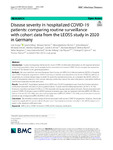2023-02-10Zeitschriftenartikel
Disease severity in hospitalized COVID-19 patients: comparing routine surveillance with cohort data from the LEOSS study in 2020 in Germany
Koppe, Uwe
Schilling, Julia
Stecher, Melanie
Rüthrich, Maria Madeleine
Marquis, Adine
Diercke, Michaela
Haselberger, Martina
Koll, Carolin E. M.
Niebank, Michaela
Ruehe, Bettina
Borgmann, Stefan
Grabenhenrich, Linus
Hellwig, Kerstin
Pilgram, Lisa
Spinner, Christoph D.
Paerisch, Thomas
Introduction
Studies investigating risk factors for severe COVID-19 often lack information on the representativeness of the study population. Here, we investigate factors associated with severe COVID-19 and compare the representativeness of the dataset to the general population.
Methods
We used data from the Lean European Open Survey on SARS-CoV-2 infected patients (LEOSS) of hospitalized COVID-19 patients diagnosed in 2020 in Germany to identify associated factors for severe COVID-19, defined as progressing to a critical disease stage or death. To assess the representativeness, we compared the LEOSS cohort to cases of hospitalized patients in the German statutory notification data of the same time period. Descriptive methods and Poisson regression models were used.
Results
Overall, 6672 hospitalized patients from LEOSS and 132,943 hospitalized cases from the German statutory notification data were included. In LEOSS, patients above 76 years were less likely represented (34.3% vs. 44.1%). Moreover, mortality was lower (14.3% vs. 21.5%) especially among age groups above 66 years. Factors associated with a severe COVID-19 disease course in LEOSS included increasing age, male sex (adjusted risk ratio (aRR) 1.69, 95% confidence interval (CI) 1.53–1.86), prior stem cell transplantation (aRR 2.27, 95% CI 1.53–3.38), and an elevated C-reactive protein at day of diagnosis (aRR 2.30, 95% CI 2.03–2.62).
Conclusion
We identified a broad range of factors associated with severe COVID-19 progression. However, the results may be less applicable for persons above 66 years since they experienced lower mortality in the LEOSS dataset compared to the statutory notification data.
Dateien zu dieser Publikation

